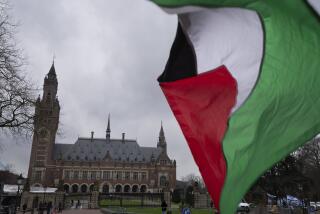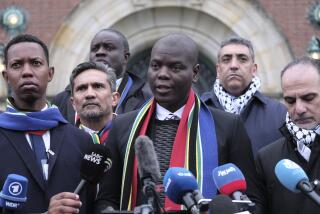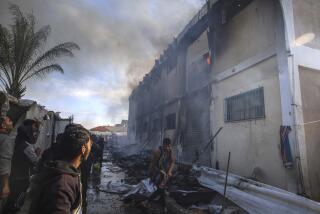At Long Last, a Response : U.N. seeks tribunal for war crimes in former Yugoslavia
- Share via
The breakup of the Yugoslav federation that began in mid-1991 has been accompanied by a degree of bloodshed unseen in Europe since World War II. In Croatia and Bosnia an estimated 28,000 persons--most civilians--have been killed. And if the routine horrors of conflict are not enough, the movements of armies and gangs of irregulars have been accompanied by sickening instances of widespread savagery. Mass exterminations, mass rapes and torture and the wholesale depopulation of long-established communities have been used to further Serbia’s expansionist policy of “ethnic cleansing.” Before these outrages the civilized world recoils in disgust.
The United Nations, at long last, is preparing a response. The Security Council has voted unanimously to seek an international war crimes tribunal to bring to justice those responsible for ordering and carrying out “serious violations of international humanitarian law” in the territory of the former Yugoslavia. Secretary General Boutros Boutros-Ghali has been instructed to present detailed proposals within 60 days on how such a tribunal should function. The United Nations is already building a computerized database listing alleged war criminals, victims and witnesses. Not since the victorious Allies began prosecutions of the major German and Japanese war criminals nearly half a century ago has such a firm international consensus on behalf of justice emerged.
The immediate hope is that the threat of trial and punishment might deter further atrocities, most of which--though by no means all--have been ascribed to Serbs by international investigators. U.N. credibility and the rule of law would be seriously compromised, however, unless every effort was made in fact to bring to justice those involved in war crimes. At the end of World War II the Allies had in custody most of the major accused war criminals. That is not the case in former Yugoslavia. To give force to its intention the United Nations should be ready to apply sanctions to states that harbor suspected war criminals. The Security Council has taken a step of some moral consequence. How it follows through politically now will be all-important.
More to Read
Sign up for Essential California
The most important California stories and recommendations in your inbox every morning.
You may occasionally receive promotional content from the Los Angeles Times.













